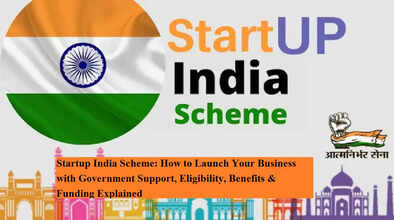Startup India Scheme: How to Launch Your Business with Government Support, Eligibility, Benefits & Funding Explained

Startup India Scheme Overview
The Startup India Scheme is one of the Indian government’s flagship initiatives aimed at encouraging entrepreneurship and fostering innovation across the country. Launched in January 2016, the program’s main objective is to transform India into a global startup hub by offering financial, technical, and regulatory assistance to new ventures. Through this initiative, startups receive tax benefits, simplified compliance procedures, funding support, and access to mentorship networks that enable growth and employment generation.
Eligibility Criteria for Startup India Scheme
To qualify under the Startup India Scheme, businesses must meet specific eligibility requirements set by the Department for Promotion of Industry and Internal Trade (DPIIT):
-
Business Type – The startup must be registered as a Private Limited Company, Partnership Firm, or Limited Liability Partnership (LLP).
-
Age of the Company – The company should be less than 10 years old from the date of incorporation.
-
Turnover Limit – The annual turnover should not exceed ₹100 crore in any of the financial years since incorporation.
-
Innovation Focus – The entity should be working towards innovation, development, or improvement of products, services, or processes.
-
Original Business – The startup must not be formed by splitting or reconstructing an existing business.
These conditions ensure that only genuine startups with innovative goals can benefit from government support.
Funding Support and Financial Assistance
To enhance access to capital, the government has established a ₹10,000 crore Fund of Funds for Startups (FFS), managed by the Small Industries Development Bank of India (SIDBI).
This fund does not directly invest in startups, but rather provides capital to SEBI-registered venture capital funds, which then invest in eligible startups.
Under this funding framework, startups can access:
-
Equity investments through venture capital firms
-
Loans and credit guarantees for financial stability
-
Priority funding based on business stage, potential, and sectoral focus
This model helps startups bypass traditional banking challenges and ensures a more sustainable and growth-oriented capital structure.
Tax Exemptions and Regulatory Benefits
The Startup India Scheme also offers several tax incentives and compliance relaxations to ease business operations:
-
Three-year income tax exemption under Section 80-IAC of the Income Tax Act
-
Exemption from capital gains tax in specific circumstances
-
Discounted patent filing fees and fast-track processing for intellectual property rights
-
Self-certification compliance under various labour and environmental laws
-
Simplified exit process, allowing startups to wind up operations within 90 days
These benefits not only reduce the financial burden on emerging entrepreneurs but also help them focus on innovation and expansion rather than bureaucratic hurdles.
Additional Benefits: Networking and Mentorship
The Startup India portal and mobile app provide a unified platform for entrepreneurs to access mentorship, connect with industry experts, and explore funding opportunities. Startups can participate in incubation programs, innovation challenges, and networking events, allowing them to collaborate with investors and other founders.
Furthermore, through Government e-Marketplace (GeM) and public procurement relaxations, startups gain access to government contracts—an opportunity traditionally reserved for larger corporations.
Conclusion
Since its inception, the Startup India Scheme has played a crucial role in shaping India’s startup ecosystem. By offering a blend of financial incentives, mentorship, and simplified regulations, the initiative has empowered thousands of young entrepreneurs to turn their ideas into successful ventures.
Today, Startup India stands as a symbol of economic growth, job creation, and innovation, driving the country toward becoming a global leader in entrepreneurship.

